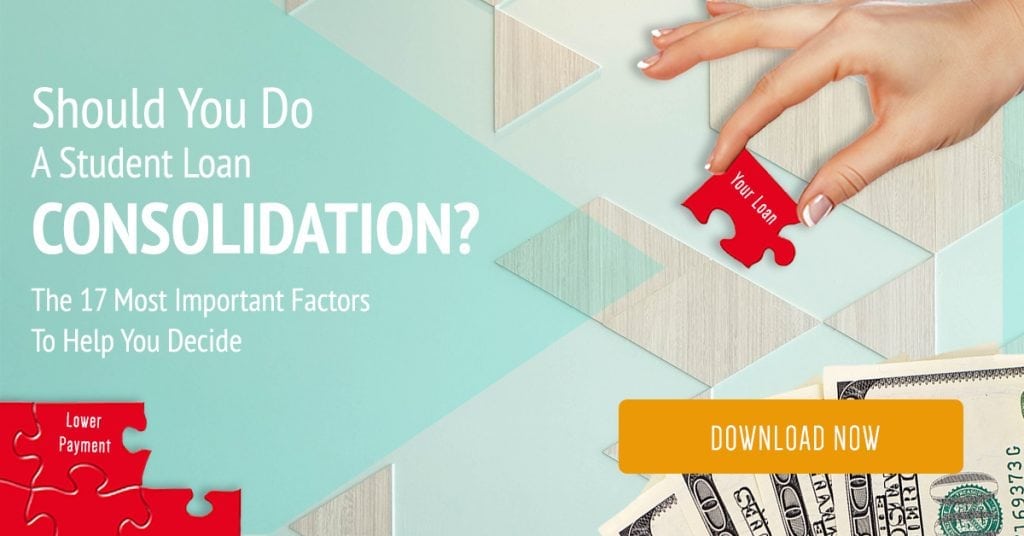Are you wondering if you can consolidate private student loans with your federal or government loans?
This is likely just one of your many questions so we’ll get right to it!
How Do I Consolidate Private Student Loans?
Many college graduates may march off the stage, not only with tears of joy, but with a heavy heart over a lamentable debt they have to deal with for the foreseeable future. Some of the most frequently asked questions on finance websites are all about dealing with student loan debt.
For example, Andrea, a mother of two, has to work another job completely unrelated to her degree to pay off her student loans. Andrea is not alone in this endeavor, with 43 million students having student loans averaging $30, 000 in 2016 (and the number continues to rise.)
While your student loan is a responsibility you cannot escape, learning how to consolidate your private student loans will help you develop a clear picture of your existing debt and finances.
So What Is Student Loan Consolidation Anyway?
Consolidating your student loans is simply combining various loans into one, or fusing many payments into a single monthly payment.
For example, it’s not uncommon for a student to have as many as 10 different student loans from 6 different servicers when they graduate.
Altogether, their loans might look a little something like this:
$2,781 to CornerStone at 5.3%
$3,140 to FedLoan at 7.4%
$1,489 to Fedloan at 8.2%
$6,497 to Granite State at 4.6%
$5,815 to Great Lakes at 3.8%
$1,984 to Great Lakes at 6.6%
$7,292 to Nelnet at 4.1%
$3,642 to Navient at 5.7%
$2,820 to Navient at 6.2%
$4,045 to Navient at 3.9%
That’s A LOT of different loans, A LOT of different interest rates, and A LOT of different servicers. Imagine trying to keep track of all of those balances, and their due dates. You’d have to be insanely organized just to keep up, and let’s face it, most people aren’t.
So by consolidating, you’ll only have to worry about ONE payment, to ONE servicer, at ONE interest rate on ONE due date. Sounds a lot simpler, right?
If you’re having a hard time juggling several monthly loan payments, you may want to consider combining your loans with a single interest rate. Rolling multiple student debts into one loan could potentially shrink your monthly payment and simplify your finances.
One other potential benefit of consolidating your private student loans is freeing your co-signer from probable liabilities.
So What’s The Difference Between a Federal Student Loan and Private Student Loan?
For one, private student loans are heavily advertised, while you probably don’t hear about federal loans at all. Between these two animals, a private student loan is clearly the king of the jungle, comparable to car or mortgage loans. It’s a closed-end consumer loan with interest rates as high as your loan amount.
Ironically, private student loans are easier to access than federal loans, until payback time.
You might be wondering if consolidating student loans is difficult. If it’s a government or federal student loan, the answer is no, it’s easy peasy! However, when it comes to private student loans, things get a little more complicated.
These two are entirely different and you should never consolidate private student loans with federal student loans if you want to continue reaping the benefits of fixed interest rates and special repayment options for your federal student loans.
I must add that private student loan holders may or may not allow you to consolidate, nor are they required to make it easy for you. Luckily, we’re here to do just that so take a look at these steps to simplify the process.
1. Ask Yourself: “Does This Make Sense For Me?”
When it comes to finances, in general, there’s really two groups you can fall into. There may be more, but for this topic let’s assume you fall into one of these two categories:
- The first group of people are mainly concerned with monthly cash flow.
They’re willing to pay a little bit more over the course of several years in an effort to control their monthly outflow of money.
This is where most people fall.
With expenses across the board generally increasing all while trying to keep some in savings and investments this is what most people try to do these days.
2. The second group of people is those that have a bit more cash reserves.
This group is looking to make a decision that makes the most financial sense at that particular time. Doesn’t mean they aren’t concerned with cash flow but they have the ability to pay a bit more each month to save money in interest.
So the first question you should ask yourself is, can you handle it?
Remember, consolidating your private student loans doesn’t lessen the amount you owe in principal.
Sure, you can lessen the monthly payment amount, but the interest could still be higher in the long run.
If you’re sure about proceeding, the real question is, will you qualify?
Unlike federal loans, which could care less about your credit history, private student loan consolidation will not leave any stone unturned.
Private student loan holders will dig deep into both your credit history and employment status. If you’ve had a rough credit history, you’ll likely have to go for other options.
In a recent article put out by NerdWallet, to qualify for a private student loan consolidation you’re credit score typically is required to be a 650 or higher if you don’t have a co-signer.
If you really do have bad credit, it’s still possible to qualify for a private loan. But your co-signer will be required to have good credit. Moreover, you’re co-signer is on the hook for your student loan payment should you not makes yours. Because of the risk involved, co-signers are typically parents.
2. Research and Investigation
The good news with having a wide market in private student loan lenders is the competition. If you find a lender willing to consolidate your loans, don’t jump at the chance right away. Competition in private student loan consolidation will give you better options if you know what to ask.
Consider these questions:

- Is the interest rate fixed or variable? A variable interest rate means that the interest can change at any moment. It’s important to make sure you understand how the rate fluctuates in order to choose the correct plan for you.
- Will your co-signer be released? Go for lenders with provisions for eventually releasing your co-signer from liabilities. Some lenders allow this provided your credit history is excellent.
- What’s the total amount of your new loan? Adjusting your monthly payment over an extended period of time will understandably increase your interest rate. Knowing about how much the total will be may help you to better plan for your future since you have a clear picture of your financial status.
- Are there any other fees or prepayment penalties? Look for lenders with no application fees, and zero fees for paying off a loan early. It’s important to also watch out for hidden charges!
- What happens if you can’t pay? It’s important to understand the process and repercussions in the (hopefully unlikely) event that you are unable to pay your loans. If not, then you’ll have to consider getting insurance for you and your cosigner’s protection.
3. Ask For Help
Consolidating your private student loans will not lessen your total loan amount.
In review, it likely won’t produce a smaller interest rate either – but it will simplify your finances!
Going into a new loan deal which could potentially last for 30 years will definitely need careful planning and execution. Read all terms carefully and ask for advice before you go for it.
Still looking for more information? Find out how to lower your student loan interest rate here.


Leave a Reply